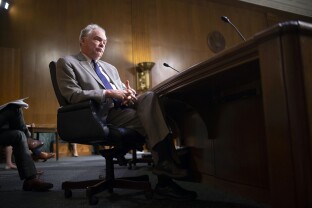Officials in Washington are worried after Russia launched what the Department of Defense called “an experimental intermediate-range ballistic missile,” an escalation in the war in Ukraine, this week.
Though it was a nonnuclear strike, the missile alarmed the U.S. and its allies because of its capacity to deliver a nuclear attack. Concerns of drastic escalation in the conflict — considered alarmist by some officials at the start of the week — became very real, very quickly.
“I’m very concerned,” Sen. Tim Kaine told NOTUS. “Much of what I know about it, I know via a classified setting,” he said. “But I’m very concerned. Our allies are concerned.”
Kaine said he’ll be attending the Halifax International Security Forum this weekend, where he expects many of the United States’ European allies to share their worries after the strike. “I think we’ll hear a lot from them,” he said.
This escalation in the Russia-Ukraine war follows Joe Biden’s authorization of Army Tactical Missile Systems, or ATACMS, for strikes from Ukraine into Russian territory. Russian President Vladimir Putin responded by changing Russia’s nuclear weapons policy, which threatens the use of nuclear weapons when the country suspects an attack across Russian boundaries.
“It is an escalation. But it was not unexpected,” Sen. Mike Rounds said of the strike on Thursday. Rounds said on Tuesday that he wasn’t particularly concerned about the possible escalation resulting from giving Ukraine long-range strike authorization. “It should have been done a long time ago,” he told NOTUS.
Classified briefings were held across the government, providing lawmakers and the administration more information about the possibility of the strike. While it is the first time a ballistic missile of this type was used on an active battlefield, according to one White House official it was treated as “more of a symbolic measure from Russia than a significant escalation.”
The State Department’s National and Nuclear Risk Reduction Center was notified by Russia only minutes before the missile was used, the official said. Both the Department of Defense and the White House acknowledged the message to the center. The White House assessed that there were no “significant battlefield impacts,” according to the official NOTUS spoke to.
The type of notification Russia issued to the State Department early on Thursday is usually reserved for ballistic missile tests, a measure enacted during the Cold War to avoid reactionary launches of nuclear weapons.
According to the Department of Defense, there’s been no change to the United States nuclear posture as a result of the strike by Russia.
“If [Putin] is using some kind of medium range, or ICBM, something he hasn’t used previously, and it has devastating lethality, I would consider that an escalation,” Sen. Mark Kelly told NOTUS after the strike.
Sen. Josh Hawley was also unnerved by the missile attack.
“I mean, there’s just no telling where this is going to go,” Hawley said. He has voted against support packages for Ukraine and sees the support for Ukraine and the recent strikes as a problem for the Trump administration.
“It’d be one thing if this administration were … in year one of the Biden administration, and it’s part of their strategy,” Hawley said. “They’d own the consequences. But that’s just not the case.”
Hawley was one of the few senators NOTUS spoke to who disagreed with Biden’s decision to allow Ukraine to strike into Russia. The Ukrainian government pushed the United States and its European allies for most of the year to allow long-range strikes using missiles provided by military partners. Republicans and Democrats alike supported Biden’s decision. Of the 15 senators that NOTUS spoke to, only three had any real reservations.
Kelly said that while it’s a complex problem, it “was the right decision” to allow Ukraine long-range strike capability. “It’s hard to be successful when they can conduct operations at range and you cannot,” he said.
The move by Biden was welcome to members on both sides of the aisle, but Sens. Richard Blumenthal, Dan Sullivan and Rounds all told NOTUS this week that Biden’s decision was “late” and should have happened months ago.
Shortly after Biden’s announcement, Ukraine launched ATACMS along with French and British Storm Shadow missiles into multiple regions of Russia in response to the policy change. While the Russian region of Kursk took the brunt of the attack, the barrage across several territories was taken as a major escalation by Russia.
Sen. Jack Reed, the Senate Armed Services Committee chairman, thought the administration had considered that Russia would view it as such. On Tuesday evening, Reed told NOTUS the White House and intelligence analysts had “worked at and looked carefully at all the possible escalation consequences.”
—
John T. Seward is a NOTUS reporter and an Allbritton Journalism Institute fellow.
Sign in
Log into your free account with your email. Don’t have one?
Check your email for a one-time code.
We sent a 4-digit code to . Enter the pin to confirm your account.
New code will be available in 1:00
Let’s try this again.
We encountered an error with the passcode sent to . Please reenter your email.


